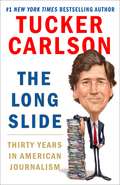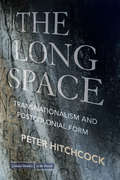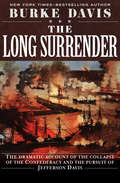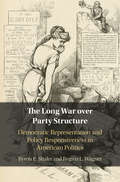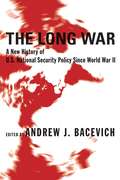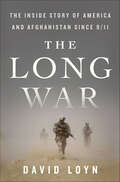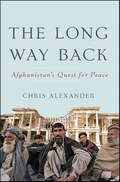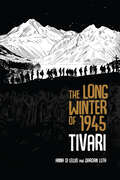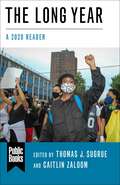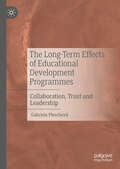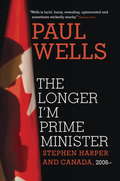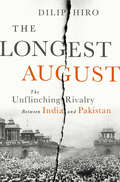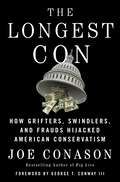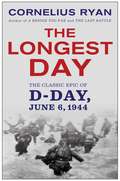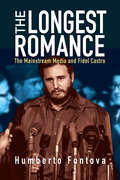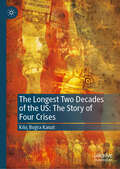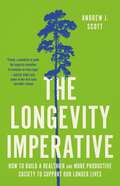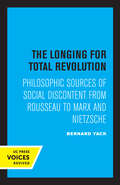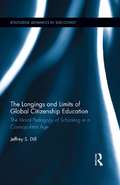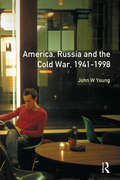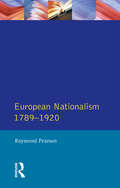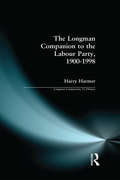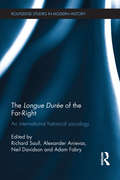- Table View
- List View
The Long Slide: Thirty Years in American Journalism
by Tucker CarlsonFrom the host of Tucker Carlson Tonight on Fox News and the New York Times bestselling author of Ship of Fools, a collection of nostalgic writings that underscore America’s long slide from innocence to orthodoxy. <P><P> Thirty years ago, Tucker Carlson got his first job out of college fact checking for a quarterly magazine, and he went on to write for many other publications before becoming the primetime Fox News host he is today. In The Long Slide, Tucker delivers a few of his favorite pieces—annotated with new commentary and insight—to memorialize the tolerance and diversity of thought that the media used to celebrate instead of punish. In snapshots spanning the 1990s to today, he’ll take you on a visit to Africa with Al Sharpton and members of the Nation of Islam to stop the civil war in Liberia in 2003, inside the (not-so-) secret armies of Operation Iraqi Freedom, and on the campaign trail with Donald Trump in 2016. <P><P> In case you missed it the first time around, you’ll also learn about the aesthetic merits of British colonialism, the second shift at a baked bean factory, the unexpected charm of James Carville, and the simple beauty of rural western Maine. With his signature wit and 20/20 hindsight, Tucker investigates in this patriotic and memorable collection a question on all of our minds: Has America really changed that much in recent decades? The answer is, unequivocally, yes. <P><P><B>A New York Times Best Seller</b>
The Long Space
by Peter HitchcockThe resurgence of "world literature" as a category of study seems to coincide with what we understand as globalization, but how does postcolonial writing fit into this picture? Beyond the content of this novel or that, what elements of postcolonial fiction might challenge the assumption that its main aim is to circulate native information globally?The Long Spaceprovides a fresh look at the importance of postcolonial writing by examining how it articulates history and place both in contentandform. Not only does it offer a new theoretical model for understanding decolonization's impact on duration in writing, but through a series of case studies of Guyanese, Somali, Indonesian, and Algerian writers, it urges a more protracted engagement with time and space in postcolonial narrative. Although each writer-Wilson Harris, Nuruddin Farah, Pramoedya Ananta Toer, and Assia Djebar-explores a unique understanding of postcoloniality, each also makes a more general assertion about the difference of time and space in decolonization. Taken together, they herald a transnationalism beyond the contaminated coordinates of globalization as currently construed.
The Long Surrender
by Burke DavisA panoramic and spellbinding history of the last days of the Confederacy and the flight, capture, and imprisonment of Jefferson Davis In April 1865, Richmond fell to the Union army and Gen. Robert E. Lee surrendered to his Northern counterpart, Ulysses S. Grant, at the Appomattox Court House. But the Civil War was far from over. Determined to keep Confederate dreams of secession alive, President Jefferson Davis and his cabinet fled the burning capital city. With Union troops in pursuit, the fugitives rallied loyalists across the South and made plans to escape to Cuba. In the aftermath of President Abraham Lincoln&’s assassination, a $100,000 bounty was placed on Davis&’s head. Finally captured in Irwinville, Georgia, the former US senator and secretary of war became a prisoner of the American government. The harsh treatment he received would inflame tensions between North and South for years to come. Meticulously researched and brilliantly told, The Long Surrender brings these dramatic events to vivid, unforgettable life and paints a fascinating portrait of Davis, one of history&’s most enigmatic figures. By shining a light on this forgotten chapter of the Civil War, bestselling author Burke Davis examines the lasting impact of America&’s bloodiest conflict on the national character.
The Long War over Party Structure: Democratic Representation and Policy Responsiveness in American Politics
by Byron E. Shafer Regina L. WagnerA long-standing debate in American politics is about the proper structure for political parties and the relative power that should be afforded to party professionals versus issue activists. In this book, Byron E. Shafer and Regina L. Wagner draw systematically on new data and indexes to evaluate the extent to which party structure changed from the 1950s on, and what the consequences have been for policy responsiveness, democratic representation, and party alignment across different issue domains. They argue that the reputed triumph of volunteer parties since the 1970s has been less comprehensive than the orthodox narrative assumes, but that the balance of power did shift, with unintended and sometimes perverse consequences. In the process of evaluating its central questions, this book gives an account of how partisan alignments evolved with newly empowered issue activists and major post-war developments from the civil rights movement to the culture wars.
The Long War: A New History of U.S. National Security Policy Since World War II
by Andrew BacevichEssays by a diverse and distinguished group of historians, political scientists, and sociologists examine the alarms, emergencies, controversies, and confusions that have characterized America's Cold War, the post-Cold War interval of the 1990s, and today's "Global War on Terror." This "Long War" has left its imprint on virtually every aspect of American life; by considering it as a whole, The Long War is the first volume to take a truly comprehensive look at America's response to the national-security crisis touched off by the events of World War II.Contributors consider topics ranging from grand strategy and strategic bombing to ideology and economics and assess the changing American way of war and Hollywood's surprisingly consistent depiction of Americans at war. They evaluate the evolution of the national-security apparatus and the role of dissenters who viewed the myriad activities of that apparatus with dismay. They take a fresh look at the Long War's civic implications and its impact on civil-military relations. More than a military history, The Long War examines the ideas, policies, and institutions that have developed since the United States claimed the role of global superpower. This protracted crisis has become a seemingly permanent, if not defining aspect of contemporary American life. In breaking down the old and artificial boundaries that have traditionally divided the postwar period into neat historical units, this volume provides a better understanding of the evolution of the United States and U.S. policy since World War II and offers a fresh perspective on our current national security predicament.
The Long War: The Inside Story of America and Afghanistan Since 9/11
by David LoynJust as U. S. soldiers and diplomats pulled out of Afghanistan, supposedly concluding their role and responsibility in the two-decade conflict, the country fell to the Taliban. In The Long War, award-winning BBC foreign correspondent David Loyn uncovers the political and military strategies—and failures—that prolonged America’s longest war.Three American presidents tried to defeat the Taliban—sending 150,000 international troops at the war’s peak with a trillion-dollar price tag. But early policy mistakes that allowed Osama bin Laden to escape made the task far more difficult. Deceived by easy victories, they backed ruthless corrupt local allies and misspent aid.The story of The Long War is told by the generals who led it through the hardest years of combat as surges of international troops tried to turn the tide. Generals, which include David Petraeus, Stanley McChrystal, Joe Dunford and John Allen, were tested in battle as never before. With the reputation of a “warrior monk,” McChrystal was considered one of the most gifted military leaders of his generation. He was one of two generals to be fired in this most public of commands.Holding together the coalition of countries who joined America’s fight in Afghanistan was just one part of the multi-dimensional puzzle faced by the generals, as they fought an elusive and determined enemy while responsible for thousands of young American and allied lives. The Long War goes behind the scenes of their command and of the Afghan government.The fourth president to take on the war, Joe Biden ordered troops to withdraw in 2021, twenty years after 9/11, just as the Taliban achieved victory, leaving behind an unstable nation and an unforeseeable future.
The Long Way Back: Afghanistan's Quest for Peace (Wayfarers Ser.)
by Chris AlexanderChristopher Alexander, Canadian’s former ambassador to Afghanistan, offers an inside look at Afghanistan recent history, and delivers a blueprint for transforming the troubled country into a viable nation. Alexander draws on expertise gained over five years on the ground in Afghanistan, chronicling the country’s initial successes following the Afghan War, the setbacks it incurred thanks to a resurgent Taliban, and the tenuous stability that multilateral diplomacy has brought the war-torn yet rebuilding nation. Readers of Ahmed Rashid’s Descent into Chaos and Alex Berenson’s Lost in Kandahar will find no more penetrating insight into Afghanistan’s past, present, and future than Christopher Alexander’s probing, expert dissection of a nation at war with itself: The Long Way Back.
The Long Winter of 1945: Tivari
by Anna Di Lellio Dardan LutaIn March 1945, at the end of the Second World War, hundreds of unarmed Albanian recruits were massacred by Yugoslav partisans. For too long, the memory of this massacre in Tivari – a coastal town in Montenegro –was suppressed by the Yugoslav state and kept alive in Kosovo only in informal versions, nurtured and retold in a spirit of ethnic mistrust and hatred. Depicted in graphic format, The Long Winter of 1945 presents an oral history of this traumatic event based on interviews with surviving participants. Archival documents and historical research provide context, placing the massacre in the broader setting of forced mass mobilization to fight, as well as the last pocket of Italian resistance. The Long Winter of 1945 situates the eventsin Tivari into the broader context of Yugoslavia’s war for liberation and the civil war between Serbs and Albanians. Bringing this traumatic event to the fore, this beautifully illustrated graphic novel rescues the memory of the victims and survivors from political exploitation.
The Long Year: A 2020 Reader (Public Books Series)
by Eric Klinenberg Joan Wallach Scott Julie Livingston Natalia Molina Jun Li Guobin Yang Andrew Lakoff Priscilla Wald Warwick Anderson Warren Breckman Adam Tooze Ananya Roy Sophie Lewis Neha Vora Margaret O'Mara Yarimar Bonilla Merlin Chowkwanyun Keeanga-Yamahtta Taylor Margaret Morganroth Gullette Marcia Chatelain Jacob A.C. Remes Joanne Randa Nucho Xiaowei Wang Miguel Centeno Jean-Paul Gagnon Keisha N. Blain Sulfikar Amir Mustafa Dikeç David Schmidt Gautam Bhan David S. Barnes Isabelle Guérin Andy Horowitz Simon Balto Éric Charmes Max Rousseau Michelle Cera Gilles Guiheux Ye Guo Renyou Hou Manon Laurent Anne-Valérie Ruinet Govindan Venkatasubramanian Mathieu Ferry Marine Al Dahdah Sherihan Radi Jeffrey Aaron Snyder Rachel Nolan Evan Lieberman Julia Foulkes Soledad Álvarez Velasco Sophie Gonick Alfonso Fierro Erick Corrêa Gianpaolo Biaocchi Jake Carlson Quentin Ravelli Rikki J. Dean Afsoun Afsahi Emily Beausoleil Selen A. Ercan Cordula Dittmer Daniel F. Lorenz Kathryn Cai Kavita SivaramakrishnanSome years—1789, 1929, 1989—change the world suddenly. Or do they? In 2020, a pandemic converged with an economic collapse, inequalities exploded, and institutions weakened. Yet these crises sprang not from new risks but from known dangers. The world—like many patients—met 2020 with a host of preexisting conditions, which together tilted the odds toward disaster. Perhaps 2020 wasn’t the year the world changed; perhaps it was simply the moment the world finally understood its deadly diagnosis.In The Long Year, some of the world’s most incisive thinkers excavate 2020’s buried crises, revealing how they must be confronted in order to achieve a more equal future. Keeanga-Yamahtta Taylor calls for the defunding of police and the refunding of communities; Keisha Blain demonstrates why the battle against racism must be global; and Adam Tooze reveals that COVID-19 hit hardest where inequality was already greatest and welfare states weakest. Yarimar Bonilla, Xiaowei Wang, Simon Balto, Marcia Chatelain, Gautam Bhan, Ananya Roy, and others offer insights from the factory farms of China to the elite resorts of France, the meatpacking plants of the Midwest to the overcrowded hospitals of India.The definitive guide to these ongoing catastrophes, The Long Year shows that only by exposing the roots and ramifications of 2020 can another such breakdown be prevented. It is made possible through institutional partnerships with Public Books and the Social Science Research Council.
The Long-Term Effects of Educational Development Programmes: Collaboration, Trust and Leadership
by Gabriela PleschováThis book investigates the long-term effects of educational development (ED) programmes on teaching perceptions and practices. The research draws comparisons between an ED programme at a university in the United Kingdom dedicated to advancing teaching, an international university where high-quality education is central to its mission, and two universities in Central and Eastern Europe with an ambition to rise in rankings and attract international students. It examines collaboration, trusting relationships and leadership as key drivers of effective practices. The book is a valuable resource for researchers, educational developers and higher education leaders .
The Longer I'm Prime Minister
by Paul WellsThe definitive portrait of Stephen Harper in power by this country's most trenchant, influential and surprising political commentator. Oh, he won, but he won't last. Oh, he may win again but he won't get a majority. Oh, his trick bag is emptying fast, the ads are backfiring, the people are onto him, and soon his own party will turn on him. And let me tell you, it couldn't happen to a nicer guy . . .Despite a constant barrage of outrage and disbelief from his detractors, Stephen Harper is on his way to becoming one of Canada's most significant prime ministers. He has already been in power longer than Lester B. Pearson and John Diefenbaker. By 2015, and the end of this majority term, he'll have caught up to Brian Mulroney. No matter the ups and downs, the triumphs and the self-inflicted wounds, Harper has been moving to build the Canada he wants--the Canada a significant proportion of Canadian voters want or they wouldn't have elected him three times. As Wells writes, "He could not win elections without widespread support in the land. . . . Which suggests that Harper has what every successful federal leader has needed to survive over a long stretch of time: a superior understanding of Canada."In The Longer I'm Prime Minister, Paul Wells explores just what Harper's understanding of Canada is, and who he speaks for in the national conversation. He explains Harper not only to Harper supporters but also to readers who can't believe he is still Canada's prime minister. In this authoritative, engaging and sometimes deeply critical account of the man, Paul Wells also brings us an illuminating portrait of Canadian democracy: "glorious, a little dented, and free."
The Longest August: The Unflinching Rivalry Between India and Pakistan
by Dilip HiroThe partitioning of British India into independent Pakistan and India in August 1947 occurred in the midst of communal holocaust, with Hindus and Sikhs on one side and Muslims on the other. More than 750,000 people were butchered, and 12 million fled their homes-primarily in caravans of bullock-carts-to seek refuge across the new border: it was the largest exodus in history. Sixty-seven years later, it is as if that August never ended. Renowned historian and journalist Dilip Hiro provides a riveting account of the relationship between India and Pakistan, tracing the landmark events that led to the division of the sub-continent and the evolution of the contentious relationship between Hindus and Muslims. To this day, a reasonable resolution to their dispute has proved elusive, and the Line of Control in Kashmir remains the most heavily fortified frontier in the world, with 400,000 soldiers arrayed on either side. Since partition, there have been several acute crises between the neighbors, including the secession of East Pakistan to form an independent Bangladesh in 1971, and the acquisition of nuclear weapons by both sides resulting in a scarcely avoided confrontation in 1999 and again in 2002. Hiro amply demonstrates the geopolitical importance of the India-Pakistan conflict by chronicling their respective ties not only with America and the Soviet Union, but also with China, Israel, and Afghanistan. Hiro weaves these threads into a lucid narrative, enlivened with colorful biographies of leaders, vivid descriptions of wars, sensational assassinations, gross violations of human rights-and cultural signifiers like cricket matches. The Longest August is incomparable in its scope and presents the first definitive history of one of the world’s longest-running and most intractable conflicts.
The Longest Con: How Grifters, Swindlers, and Frauds Hijacked American Conservatism
by Joe ConasonA sardonic chronicle of how conservatism turned into a racketeering enterprise – and why Donald Trump became the living emblem of the American right’s moral decay.The Longest Con tells the fascinating story of the partisan con artists who have corrupted conservative politics in our time, creating a toxic phenomenon that culminated in the election of Donald Trump, a bumptious fraud whose checkered career and tawdry retinue, including his presidential cabinet, have featured almost every variety of scam. But long before he appeared, Trump’s path to power was blazed by the motley horde of swindlers and quacks who preceded him.From the “professional anti-communists” (whose tactics even J. Edgar Hoover despised) to the “populist” grifters of the Tea Party movement and the religious charlatans of the “prosperity gospel” (who provided a pious front for Trump), the right-wing ripoff has remained remarkably consistent, even as personalities change and new technologies emerge: Stir up anger and resentment, demonize political opponents, promise vengeance, and collect donations from the gullible. It’s a highly lucrative game that any unscrupulous charlatan can play, as many have – and they are named in these pages.In an unsparing and often comic narrative, Joe Conason explores the right’s long, steep descent into a movement whose principal aim is not to protect freedom or defend the Constitution, but merely to line the pockets of pretenders and blowhards whose malevolent tactics now endanger the nation.
The Longest Day: The Classic Epic of D-Day
by Cornelius RyanThis is the classic story of the invasion of Normandy, and a book that endures as a masterpiece of living history. A compelling tale of courage and heroism, glow and tragedy, The Longest Day painstakingly recreates the fateful hours that preceded and followed the massive invasion of Normandy to retell the story of an epic battle that would turn the tide against world fascism and free Europe from the grip of Nazi Germany.
The Longest Night: Polemics and Perspectives on Election 2000
by Arthur J. Jacobson Michel Rosenfeld22 essays on the controversial 2000 presidential election, some from participants, some from contemporaneous observers, some from people who have analyzed the record afterward. About equal division between those who think the electoral and legal processes worked properly and gave satisfactory results, and those who are critical. Five are views from abroad.
The Longest Romance
by Humberto FontovaFidel Castro jailed political prisoners at a higher rate than Stalin during the Great Terror. He murdered more Cubans in his first three years in power than Hitler murdered Germans during his first six. Alone among world leaders, Castro came to within inches of igniting a global nuclear holocaust.But you would never guess any of that from reading the mainstream American media. Instead we hear fawning accounts of Castro liberating Cuba from the clutches of U.S. robber-barons and bestowing world-class healthcare and education on his downtrodden citizens. "Propaganda is vital-the heart of our struggle," Castro wrote in 1955. Today, the concept is as valid to the Cuban regime as ever.History records few propaganda campaigns as phenomenally successful or enduring as Castro and Che's. The Longest Romance exposes the full scope of this deception; it documents the complicity of major U.S. media players in spreading Castro's propaganda and in coloring the world's view of his totalitarian regime. Castro's cachet as a celebrity icon of anti-Americanism has always overshadowed his record as a warmonger, racist, sexist, Stalinist, and godfather of modern terrorism. The Longest Romance uncovers this shameful history and names its major accomplices.
The Longest Two Decades of the US: The Story of Four Crises
by Kılıç Buğra KanatThis book chronicles the pivotal transformations in the United States from 2001 to 2021, with a particular focus on its evolving global image, internal political dynamics, and economic landscape. The phrase "the long two decades" describes a period characterized by a succession of four major crises that profoundly impacted American society and politics: the 9/11 attacks, the invasion of Iraq, the Great Recession, and the COVID-19 pandemic. Intriguingly, these contemporary crises parallel four significant events of the 20th century—Pearl Harbor, the Vietnam War, the Great Depression, and the Spanish Flu—that similarly reshaped the nation&’s political and social landscape. The book provides historical contexts, examines the duration of these crises, and explores their aftermath effects on American society, while also underscoring the unique differences among them.
The Longevity Imperative: How to Build a Healthier and More Productive Society to Support Our Longer Lives
by Andrew J. Scott&“A manifesto to guide the longevity revolution&” (David Sinclair) for individuals, institutions, and society to adapt to the reality of living longer lives Thanks to increases in life expectancy, we can now expect to live for a long time. Most of us would welcome an extra day in the week, so why do so many of us view the prospect of additional years with fear and skepticism? The reason is simple: society is not currently structured to support long lives. Rather than thinking in terms of the needs of a rising number of older people, we must instead support the young and middle-aged to prepare differently for the longer futures they can expect. The Longevity Imperative outlines the innovations needed to make the most of these longer lives: substantial changes to our health system, economy, and financial sector, as well as in how we manage our careers, health, finances, and relationships. Instead of seeing longevity as a problem, economist Andrew J. Scott challenges us to view it as an opportunity. This book charts a course to address the individual, social, political, economic, and cultural changes required so that all of us—regardless of age—can live lives that are not just longer but healthier, happier, and more productive.
The Longing for Total Revolution: Philosophic Sources of Social Discontent from Rousseau to Marx and Nietzsche
by Bernard YackBernard Yack seeks to identify and account for the development of a form of discontent held in common by a large number of European philosophers and social critics, including Rousseau, Schiller, the young Hegel, Marx, and Nietzsche. Yack contends that these individuals, despite their profound disagreements, shared new perspectives on human freedom and history, and that these perspectives gave their discontent its peculiar breadth and intensity. This title is part of UC Press's Voices Revived program, which commemorates University of California Press’s mission to seek out and cultivate the brightest minds and give them voice, reach, and impact. Drawing on a backlist dating to 1893, Voices Revived makes high-quality, peer-reviewed scholarship accessible once again using print-on-demand technology. This title was originally published in 1992.
The Longings and Limits of Global Citizenship Education: The Moral Pedagogy of Schooling in a Cosmopolitan Age (Routledge Advances in Sociology #109)
by Jeffrey S. DillAs the world seemingly gets smaller and smaller, schools around the globe are focusing their attention on expanding the consciousness and competencies of their students to prepare them for the conditions of globalization. Global citizenship education is rapidly growing in popularity because it captures the longings of so many—to help make a world of prosperity, universal benevolence, and human rights in the midst of globalization’s varied processes of change. This book offers an empirical account from the perspective of teachers and classrooms, based on a qualitative study of ten secondary schools in the United States and Asia that explicitly focus on making global citizens. Global citizenship in these schools has two main elements, both global competencies (economic skills) and global consciousness (ethical orientations) that proponents hope will bring global prosperity and peace. However, many of the moral assumptions of global citizenship education are more complex and contradict these goals, and are just as likely to have the unintended consequence of reinforcing a more particular Western individualism. While not arguing against global citizenship education per se, the book argues that in its current forms it has significant limits that proponents have not yet acknowledged, which may very well undermine it in the long run.
The Longman Companion to America, Russia and the Cold War, 1941-1998 (Longman Companions To History)
by John W. YoungThis reference guide throws light on almost every aspect of postwar international history from the rise of Mao's China to the Bosnian Civil War. It provides a huge wealth of information on East-West relations setting events, crises and conflicts in their full international context.
The Longman Companion to European Nationalism 1789-1920 (Longman Companions To History)
by Raymond PearsonA highly topical analysis of European Nationalism from the French Revolution through to the aftermath of the First World War, when the nationalist issues and problems that dominate the political landscape of our own time were already fully established. Covering an enormous range of peoples -- from the Icelanders to the Gypsies, from Brittany to Wallachia -- the book presents a wealth of historical geopolitical information unavailable elsewhere. Essential as a reference work, it also provides a unique opportunity to survey systematically a crucial but fragmented subject in its full European context. For historians, political scientists, departments of European studies, and general readers.
The Longman Companion to the Labour Party, 1900-1998 (Longman Companions To History)
by Harry HarmerA timely reference guide to the Labour Party which brings together the essential facts and figures about the Party since its foundation through to the 'New Labour' of the 1990's. It is the essential reference book for anyone wanting reliable information on the Labour Party.
The Longue Durée of the Far-Right: An International Historical Sociology (Routledge Studies in Modern History)
by Neil Davidson Alexander Anievas Richard Saull Adam FabryThis volume brings together a number of international scholars to offer an original analysis of far-right movements and politics, challenging the existing literature through a very different methodological and theoretical perspective. The approach offered here is that of ‘longue durée’ analysis, whereby the far-right is understood as an evolving subject of capitalist modernity. The authors argue that an assessment of the contemporary characteristics of the far-right needs to consider the ways in which it is a product of deeper and longer-term structures of socio-economic and political development, than, for example, the inter-war crises of capitalism. The book aims to provide a critical and theoretically-informed assessment of the history of the far-right that centres on the international as key to any understanding its evolution, and which distinguishes between the fascist and non-fascist variants as an essential precondition for comprehending the far-right presence in contemporary politics
The Look
by Michelle ObamaThe Look is a stunning journey through Michelle Obama's style evolution, in her own words for the first time.In this celebration of style, from the moment she entered the public eye during her husband's U.S. Senate campaign through her time as the first Black First Lady of the United States and today as one of the country's most influential figures, Michelle Obama shares how she uses the beauty and intrigue of fashion to draw attention to her message.Featuring the voices of Meredith Koop, Obama's trusted stylist, as well as her makeup artist Carl Ray, hairstylists Yene Damtew and Njeri Radway, and many of the designers who have dressed Obama for notable events, The Look brings readers behind the scenes not only to reveal how her most memorable looks came together but also to tell a powerful story about how we present ourselves.Obama's intimate and candid stories illuminate how her approach to dressing has evolved throughout her life - from the colourful sheath dresses, cardigans, and brooches she wore during her time as First Lady to the bold suits, denim, and braids of her post-White House life and all the active looks and beautiful gowns in between.In The Look, Michelle Obama explores the joy and the purpose of fashion and beauty and how - when wielded with grace and care - they can uplift and affirm the values one holds most dear. Confidence, she concludes, cannot be put on. But when you're wearing something that's intentional or beloved, clothing can make you feel like the best version of yourself.
